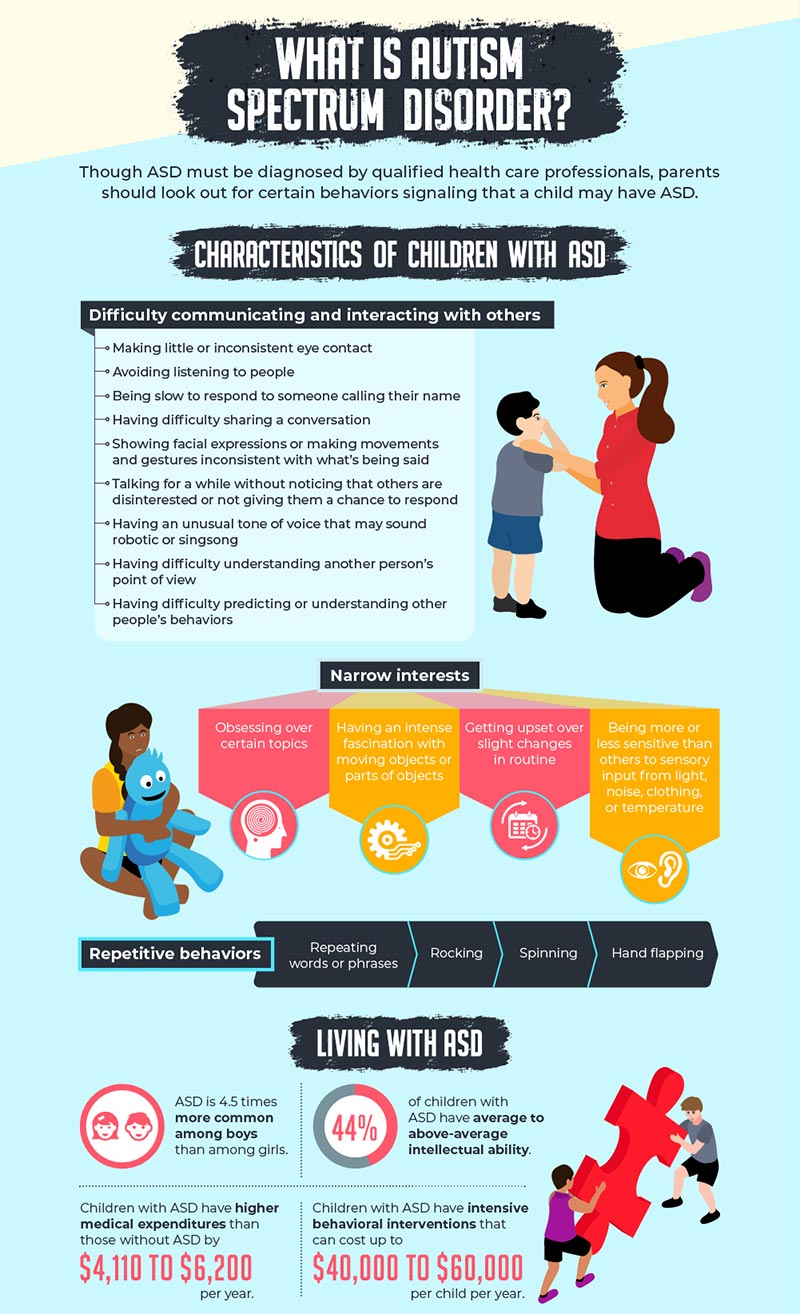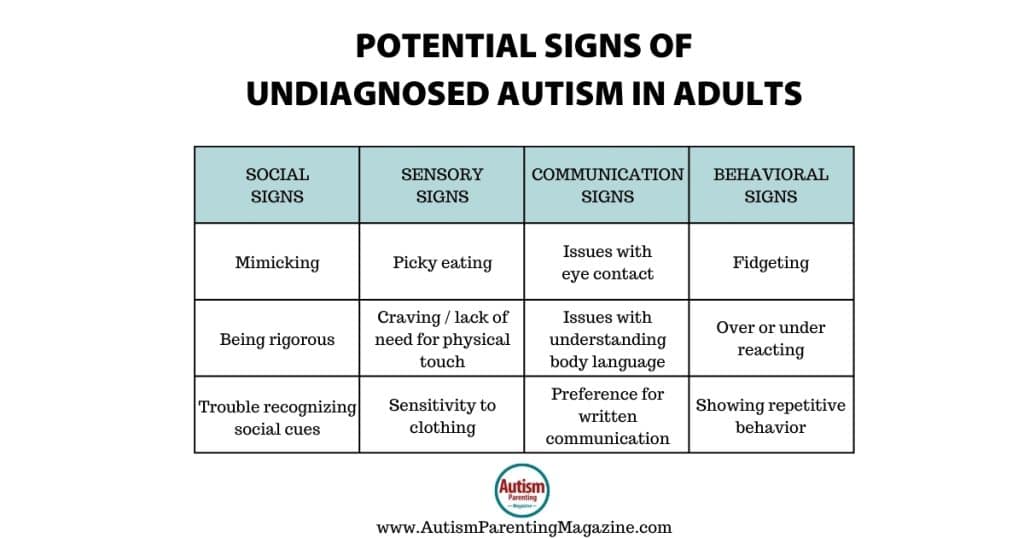Do Autism Spectrum Therapies support developing independence in teens with ASD?
Do Autism Spectrum Therapies support developing independence in teens with ASD?
Blog Article
Key Symptoms And Signs to Recognize in People With Behavior Autism
When you experience somebody with behavioral autism, acknowledging crucial symptoms and signs is necessary. You could observe difficulties in social interactions and communication, as well as a strong need for regimens. In addition, sensory level of sensitivities can lead to overwhelming experiences. Understanding these characteristics can enhance your assistance and treatments, however there's even more to reveal about just how these actions show up in everyday scenarios. Allow's explore what these indicators really look like.
Challenges in Social Communications
When you connect with a person on the autism range, you could notice they struggle with social cues and communication. These obstacles can make social communications feel overwhelming for them.
Additionally, you might locate that they choose routines and acquainted settings, which can restrict their desire to take part in new social scenarios. They may speak regarding their interests in terrific information without observing if you're interested when they do engage. This can bring about prejudiced discussions that leave you feeling disconnected. Recognizing these challenges can help you approach communications with compassion and patience, promoting a much more comfy setting for both of you.
Problem With Verbal and Non-Verbal Interaction

Non-verbal interaction can be also extra tough. You may see a lack of eye contact or minimal use of gestures, which can make communications feel awkward. Faces may not always line up with the conversation, leading to complication concerning their feelings. Recognizing these signs is important, as it aids you much better support and engage with people on the autism range. By understanding their interaction difficulties, you can foster a lot more meaningful links and supply a more encouraging environment.
Recurring Behaviors and Routines
Interaction challenges frequently come with other indicators of autism, such as recurring actions and a strong choice for regimens. You might see that people with autism often participate in details, repetitive actions, like hand-flapping, rocking, or duplicating expressions. These behaviors can give convenience and a sense of control in an often frustrating world.
Routines are similarly crucial; lots of individuals grow when they follow an organized routine. You may locate that modifications to these routines can bring about significant distress. As an example, if they have a day-to-day ritual of consuming morning meal at a specific time or adhering to a particular path to college, any kind of disruption can cause anxiety.
Identifying these patterns aids you understand their habits and offer support. By fitting their need for routine and enabling repeated activities, you can produce a much more comfortable atmosphere that alleviates their difficulties.
Sensory Level Of Sensitivities

Typical Sensory Triggers
Sensory sensitivities can considerably impact day-to-day live for people with autism, as particular stimulations commonly cause overwhelming reactions. Typical sensory triggers consist of loud sounds, bright lights, and strong smells. You could discover that unexpected sounds, like alarm systems or alarms, trigger anxiousness or distress. Likewise, fluorescent lights in stores can really feel severe and uneasy. Appearances can also play a considerable duty; rough fabrics or specific food appearances may be unbearable for you. Additionally, crowded locations can bewilder your detects, making it difficult to kick back or focus. Understanding these triggers can aid you manage your environment much better. By recognizing what affects you, you can take actions to reduce discomfort and boost your everyday experiences.
Behavioral Responses Clarified
Recognizing your behavior responses to sensory level of sensitivities is important, as they usually expose how you engage with the globe. You may additionally find on your own seeking certain sensory experiences, like deep stress or quiet settings, to help ground yourself. Identifying these patterns helps you recognize your needs far better and can direct how you interact them to others.
Coping Techniques Review
Identifying your sensory level of sensitivities is just the initial step; now it's time to explore coping strategies that can aid you manage those experiences view it properly. Beginning by producing a sensory toolkit tailored to your needs. Establishing a structured regimen can additionally give predictability, reducing anxiety around sensory overload.
Limited Passions and Focus
While numerous people create a vast array of interests, those with autism typically demonstrate limited rate of interests and an intense concentrate on certain topics. You might see that a person with autism can invest hours delving into their favored subject, whether it's a particular kind of train, a specific flick, or a clinical principle. This extreme focus isn't just a pastime; it can end up being a central part of their identity and social interactions.
You may locate that conversations focus on these interests, and they may struggle to involve in broader subjects. For them, these focused interests provide convenience and a sense of mastery. While it's important to encourage expedition of new topics, valuing their interests is similarly necessary. By comprehending and recognizing these restricted rate of interests, you can promote an encouraging environment where they really feel valued and recognized, allowing for even more purposeful connections and communications.
Emotional Law Troubles
Individuals with autism typically deal with difficulties in emotional guideline, which can be influenced by their intense concentrate on details rate of interests. You could discover that when an individual is deeply engaged in a favored activity, they can experience strong feelings, whether enjoyment or aggravation. When points do not go as prepared., this intensity sometimes makes it tough for them to move gears or handle their sensations - Autism Behavioral learn this here now Therapy.

Variability in Developmental Milestones
When it comes to developing landmarks, you'll discover that people with autism usually reveal a wide range of variability. You may see a youngster succeed in language abilities however battle with social interactions.
It's essential to acknowledge that each person's journey is unique. Observing these patterns can aid you comprehend their staminas and needs much better.
Often Asked Questions
How Is Autism Detected in Children and Adults?
To detect autism in kids and adults, experts assess actions, interaction abilities, and social interactions. They typically use standard tests, meetings, and monitorings to identify if an individual fulfills the requirements for autism range disorder.
Exist Different Kinds Of Autism Range Disorders?
Yes, there are various sorts of autism range disorders, consisting of Asperger's syndrome and prevalent developing disorder-not otherwise specified. Each type varies in intensity and qualities, so comprehending these differences can help you much better support people with description autism.
What Therapies Are Reliable for Individuals With Autism?
When thinking about reliable therapies for people with autism, you'll locate options like Applied Actions Analysis, speech treatment, and work-related treatment. Each approach can assist boost communication, social skills, and day-to-day functioning customized to individual requirements.
Can People With Autism Lead Independent Lives?
Yes, people with autism can lead independent lives. With the best support, abilities training, and sources, you can help them establish self-sufficiency, handle day-to-day jobs, and thrive in different settings, cultivating their independence.
How Can Family Members Support Loved Ones With Autism?
You can support your liked ones with autism by producing an organized setting, urging their passions, exercising patience, cultivating interaction, and promoting social skills. Commemorate their accomplishments, despite exactly how tiny, and develop a supportive area.
Although many people on the autism spectrum can comprehend and use language, they commonly encounter significant challenges with both verbal and non-verbal interaction. Identifying these indicators is crucial, as it aids you better support and involve with individuals on the autism spectrum. You could see that people with autism usually involve in details, repetitive actions, like hand-flapping, rocking, or duplicating expressions.Sensory level of sensitivities can substantially influence everyday life for individuals with autism, as specific stimulations often set off overwhelming reactions.When it comes to developing landmarks, you'll see that people with autism typically reveal a wide array of irregularity.
Report this page